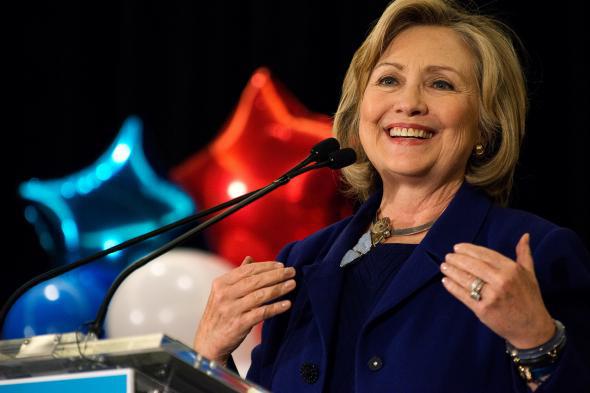Since officially kicking off her presidential campaign, Hillary Clinton has answered somewhere between eight to 13 questions from reporters, depending on how generous we’re willing to be with our definition of the word answered. Her most specific response, for instance, came more than a month ago: “We have a plan for my plan,” Clinton said after being asked about the details of her campaign finance reform agenda, which a month later remains more of a vague promise than a concrete proposal. In the past three weeks, meanwhile, the runaway Democratic frontrunner hasn’t bothered to so much as dodge a single question from a reporter, let alone answer one.
Clinton’s stonewalling initially sparked an existential crisis among the national press corps, many of whom were reduced to literally running after her caravan in Iowa. But in the weeks since, the political press has turned noticeably hostile in the face of her silence. Outlets like the National Journal, NPR, and NBC News are keeping their own tallies of the paltry number of reporter-asked questions Clinton has fielded. The New York Times, which is running a reoccurring feature listing the questions its reporters would ask Clinton if they had the chance, summed up the general mood on Monday morning with a blog post wryly headlined, “Today in Politics: Hillary Clinton’s Busy Week Presents More Opportunities for No Questions.” Local editorial boards, meanwhile, have begun making the implicit criticism explicit. “If she can’t handle a tough question from a journalist,” asked the Las Vegas Review-Journal, “how can she handle the duties of the highest office in the land?”
The press is right to publicly lodge such complaints. Clinton’s failure to address legitimate questions about what she would do as president and what she did do as secretary of state should be an embarrassment for someone who wants voters to send her to the White House. But we shouldn’t expect things to change anytime soon. Clinton’s media strategy may be shameful—but it’s also smart.
Clinton simply has no reason to veer from her campaign’s carefully written script. In the absence of a serious primary challenger, Clinton would risk more than she stands to gain by fielding questions about her family foundation’s cozy relationship with its donors while she was secretary of state, or reliving her Iraq war vote when she was a U.S. senator. A candidate who plays the media game well can generate plenty of buzz to fuel an upstart campaign—think John McCain’s Straight Talk Express in 2000—but the equation isn’t the same for establishment candidates like Clinton. She doesn’t want more attention from reporters; she wants less. And the media’s growing frustrations notwithstanding, denying reporters the chance to ask her questions is the best way to make that happen. Every story about Clinton avoiding questions is a story that isn’t about how she mishandled one.
It’s true that, as the Times put it Monday, “the longer she goes without taking reporters’ questions, the less recovery time she has from any mistakes.” But Clinton could easily wait until the fall—if not longer—before stepping out on the political high wire. A slip then would still give her plenty of time to catch her balance before the general election. In the meantime, the longer she stays safely on the ground, the greater the chance that when she does inevitably stumble there will be fewer Democrats willing to give her a push—and even more desperate to catch her. It might leave her a little rusty come the general election. But as Clinton learned in 2008, she can’t win a general election if she doesn’t win the primary first.
